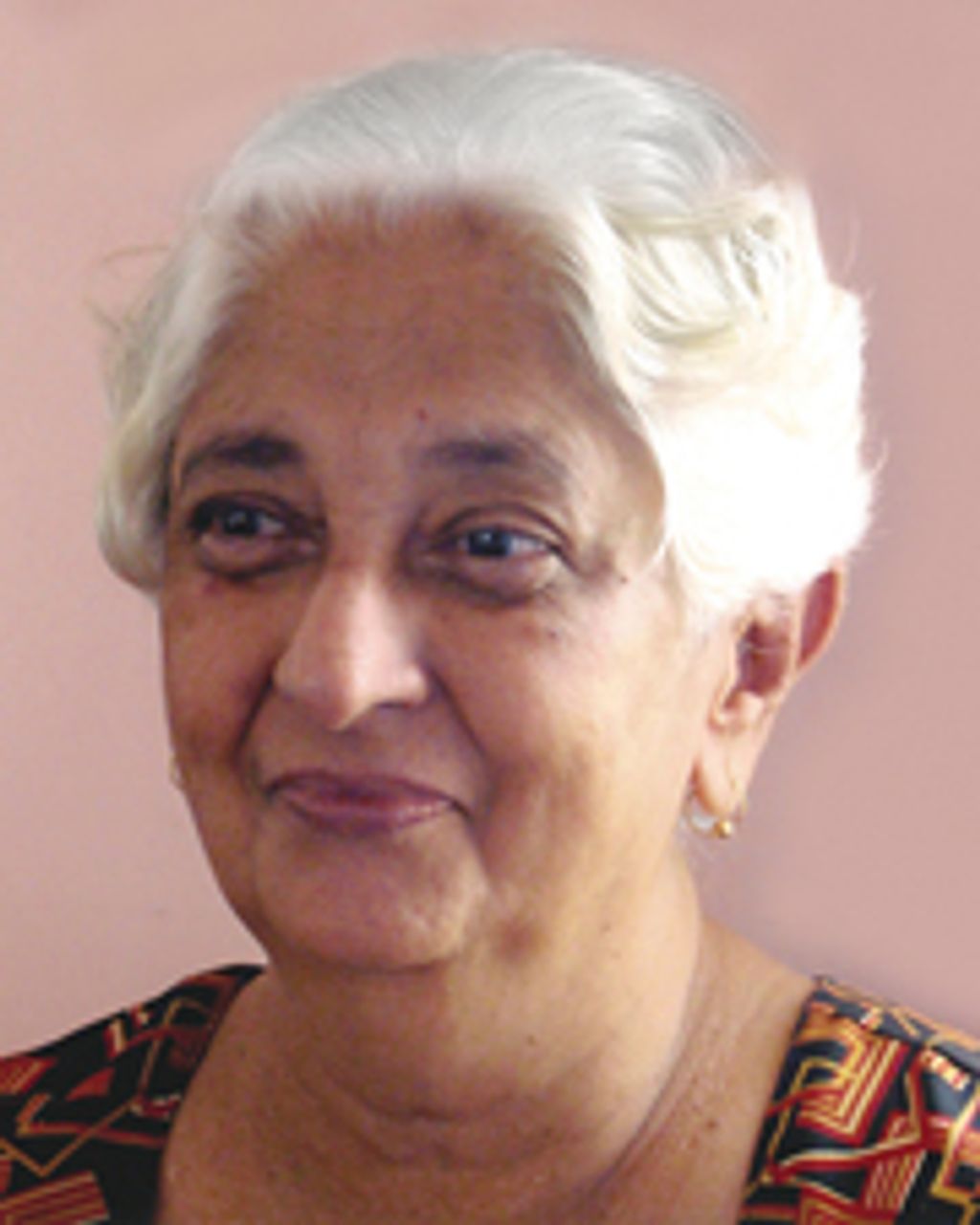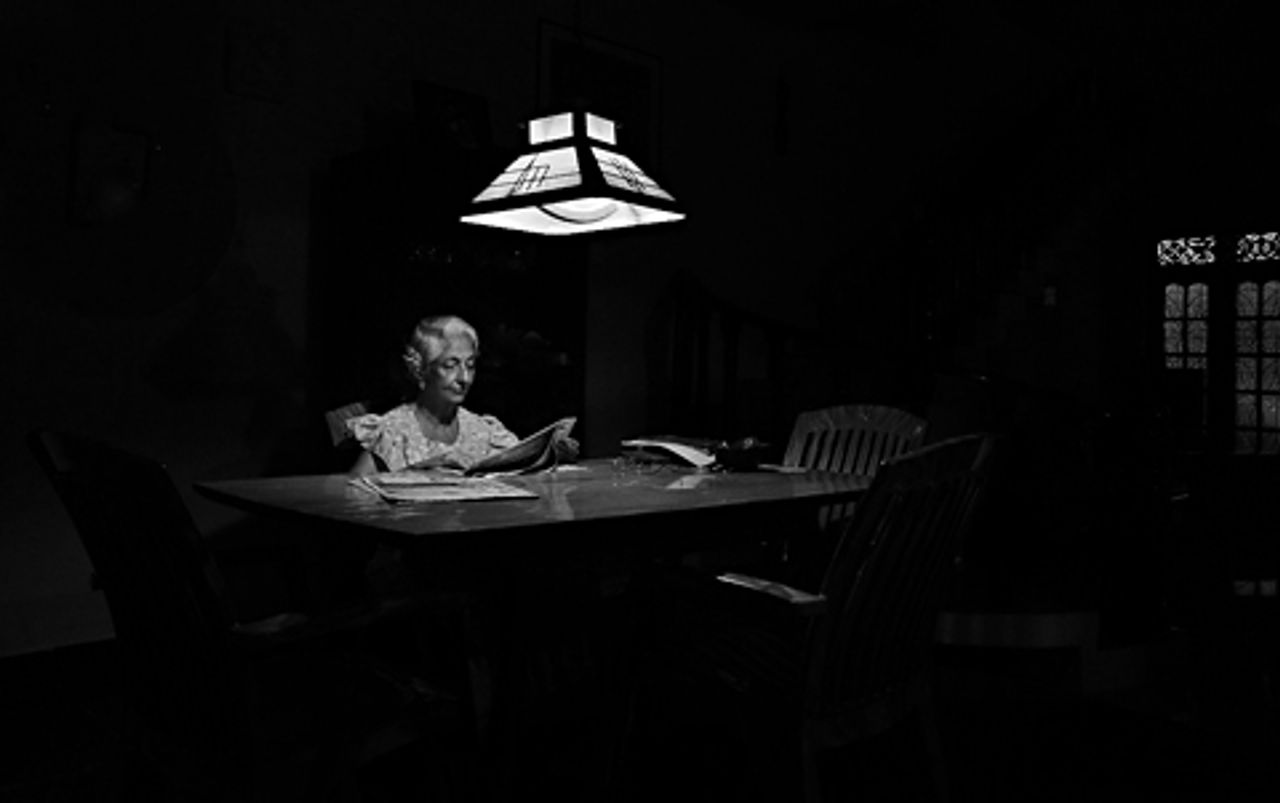It is with a great sense of loss that we report the untimely death of comrade Piyaseeli Wijegunasingha, a member of the Socialist Equality Party (SEP), the Sri Lankan section of the International Committee of the Fourth International (ICFI). Piyaseeli was a lifelong Trotskyist, a Marxist scholar, and fighter for the interests of the international working class.

Piyaseeli died early on Thursday morning after her vital organs failed following surgery for breast cancer. She had undergone treatment for the cancer several years earlier and, in the intervening years, had suffered from several other illnesses. She was just 67.
Piyaseeli was the wife and partner of Wije Dias, the general secretary of the SEP. She also leaves behind her 42-year-old son, Keerthi Ranaba Wijegunasinghe, her daughter-in-law, Anjana, and seven-month-old granddaughter, Janarthi.
Everyone who knew Piyaseeli—party members, colleagues and students at the University of Colombo, friends and family—appreciated her warmth, culture and dignity. She challenged and educated an entire generation of students in the study of literature, which was her intellectual passion. Even her political and academic foes treated her with respect.
Among party comrades, Piyaseeli was a generous host, whose home was always open. Generally reserved, she could, on occasions, be encouraged to act in plays and to sing with her fine voice. Along with her love of literature went an appreciation for a wide range of music, including that of Beethoven.
Piyaseeli was born on February 20, 1943 in the rural village of Hapugala, near Galle in southern Sri Lanka. She attended the Mahamodera village school before entering the Southland Girls’ College in Galle, which, she always recalled, made a tremendous impact on her. She was introduced to English literature and first demonstrated her intellectual and rhetorical skills in leading the school debating team.
Piyaseeli’s life, however, was fundamentally shaped by Trotskyism. She was drawn into politics as an undergraduate at the Peradeniya University and emerged as a leader during student protests in 1965 over the inadequacy of hostel facilities. The police suppressed the demonstrations with batons and tear gas. Piyaseeli was suspended from university for three months along with others, including the student union president Wije Dias, who had by then become her companion.
 Wije Dias was part of a group of radicalised youth who were seeking to understand the historic betrayal of Trotskyism by the Lanka Sama Samaja Party (LSSP) in 1964, when it entered the bourgeois government of Madame Sirima Bandaranaike. This fundamental abandonment of the principles of socialist internationalism was a product of an international opportunist tendency led by Michel Pablo and Ernest Mandel that had sanctioned years of political backsliding by the LSSP.
Wije Dias was part of a group of radicalised youth who were seeking to understand the historic betrayal of Trotskyism by the Lanka Sama Samaja Party (LSSP) in 1964, when it entered the bourgeois government of Madame Sirima Bandaranaike. This fundamental abandonment of the principles of socialist internationalism was a product of an international opportunist tendency led by Michel Pablo and Ernest Mandel that had sanctioned years of political backsliding by the LSSP.
The International Committee of the Fourth International (ICFI) was founded in 1953 to oppose Pabloite opportunism. Drawing on the lessons of the struggles waged by the ICFI, the Revolutionary Communist League (RCL) was established in 1968 as its Sri Lankan section, under the leadership of Keerthi Balasuriya. Wije was a founding member and Piyaseeli joined soon after.
Piyaseeli married Wije in 1967, and in the same year, she became an assistant lecturer at the University of Colombo. Wije took a similar post the following year—when their son Keerthi was born. In 1969, Piyaseeli and Wije left for England for post graduate studies. She obtained an honours degree in English literature from the University of Leeds.
While in England, Piyaseeli was a member of the British section of the ICFI—the Socialist Labour League (SLL), which had played the leading role in the struggle against the US Socialist Workers Party’s (SWP) unprincipled reunification with the Pabloite camp in 1961-63. She later recalled that her participation in SLL campaigns and education camps had strengthened her internationalist outlook.
Wije and Piyaseeli returned to Sri Lanka in 1972 in the wake of the political turbulence that followed the installation of the second Bandaranaike coalition government that had deployed the army in 1971 to crush an armed uprising of rural Sinhala youth by the Janatha Vimukthi Peramuna (JVP). The security forces killed an estimated 15,000 young people.
The RCL defended the JVP against this state repression, despite its fundamental differences with the JVP’s Sinhala nationalist and guerrillaist politics. As a result, the RCL’s newspapers were banned and two members killed while in police custody. The RCL nevertheless continued its campaign against the government’s widening witch-hunt.
In 1973, Piyaseeli played a leading role in the party’s defence of well-known artists who were critical of the coalition government and whose works had been banned. These included: Damma Jagoda’s The Dead Rise Again, Simon Navagaththegama’s Puslodan (Empty Cookies) and Saman Susiri’s Wessanthara. The party’s principled stand won considerable respect, including from the artists themselves.
Piyaseeli wrote under the pen name of Manel Hapugala for the party newspapers in the field of art and literature—an area in which RCL general secretary Balasuriya was also interested. As well, she participated and performed in RCL-produced plays on political topics, including one that exposed the role of Stalinism by examining the infamous Moscow Show Trials.
In her work as a university lecturer, Piyaseeli elaborated a Marxist, that is a materialist, approach to literature and literary criticism. Her first book—A Materialist Study of Literature—published in 1982, took issue with the philosophical idealism and religious conceptions that dominated literary criticism in Sri Lanka. “Many bourgeois critics in Sri Lanka have based their methods of criticism on the idealist concepts continued in the aesthetic Rasavada School [in India]. The present work includes a critique of many current conceptions from the standpoint of the dialectical materialist outlook,” she wrote in the preface.
Ediriweera Sarachchandra, a prominent Sri Lankan literary authority whose work was criticised in the book, responded by declaring that Piyaseeli knew nothing about philosophy. She replied with a second book—A Marxist Study of Modern Sinhala Literary Criticism—further exposing the poverty of Sarachchandra’s philosophical method and developing a critique of the work of two other prominent Sri Lankan writers, Martin Wickramasinghe and Gunadasa Amarasekara.
The terrible political consequences of the LSSP’s 1964 betrayal, and its adaptation to Sinhala supremacism, became evident in the wake of the Bandaranaike government’s defeat in 1977. The rightwing United National Party (UNP) government, led by J.R. Jayawardene, turned to pro-market restructuring, opening up the island to foreign investment. In response to mounting opposition, Jayawardene whipped up anti-Tamil chauvinism to divide the working class, eventually launching the island’s long and bitter civil war in 1983 against the Liberation Tigers of Tamil Eelam (LTTE).
These years were particularly challenging for the RCL. In Britain, the SLL’s successor, the WRP, which was formed in 1973, itself began to politically backslide, accommodating to the very Pabloite politics it had fought so strenuously in the early 1960s. Because of its political authority within the international movement, this had a damaging impact on all the sections of the ICFI, including the RCL. But from 1982, the Workers League in the US launched a political struggle against the opportunism of the WRP leadership, culminating in the split of 1985-86. Piyaseeli stood firmly with the RCL and the ICFI in the split, and in its aftermath, contributed to the renaissance of Marxism that took place within the international Trotskyist movement.
Tragically, in December 1987, Keerthi Balasuriya died suddenly, at the age of 39, of a massive heart attack. In these difficult circumstances, Wije Dias shouldered the responsibility of leading the RCL as its new general secretary. While engaged in her own work, Piyaseeli was a constant source of support.
As the Sri Lankan civil war intensified, Jayawardene was forced, in 1987, to accept a peace deal, known as the Indo-Lanka Accord, that was brokered by the Indian government. The JVP responded with a vicious communal campaign, denouncing the accord as a betrayal of the nation. JVP gunmen murdered hundreds of political opponents, trade unionists and workers, including three RCL members, who refused to back its chauvinist campaign. Amid ongoing JVP and state terror, Wije Dias and other leading RCL members went underground. Piyaseeli joined them.
In the 1990s, Piyaseeli waged an important polemic against Professor Sucharitha Gamlath, who had been an RCL member, and had written on literary criticism. Gamlath had left the party indicating support for the distortion of Marxist philosophy propounded by WRP leader Gerry Healy. He launched an attack on Piyaseeli’s previous books, to which she responded with a third book—A Reply to Sucharitha Gamlath: Marxist Principles on Criticism of the Arts—published in 1995.
In her fourth book—The god of small things: A review and a reply—Piyaseeli again defended the principles of Marxism. Sucharitha Gamlath had objected to her review of the novel “The god of small things” by Indian writer Arundhathi Roy, as being uncritical. In her lengthy response, Piyaseeli demonstrated the relationship between Gamlath’s opportunist politics and his superficial approach to literary criticism. He had over-emphasised Roy’s political limitations without giving sufficient consideration to the book’s significant insights into Indian society.
Piyaseeli’s works gained considerable influence. She was instrumental in founding a course in Marxist literary criticism at the Colombo University and was promoted to the position of professor and head of the Department of Sinhala Literature in 1997. She held that position until her retirement in 2009.
At the same time, Piyaseeli translated a number of seminal works of the Trotskyist movement into Sinhala, including: a section of Leon Trotsky’s In Defence of Marxism; The Heritage We Defend by David North, Gerry Healy and His Place in the History of the Fourth International also by David North; “Post-Soviet Bolshevism and the Avant-Garde Artists” and The Aesthetic Component of Socialism by David Walsh. Piyaseeli also contributed her own reviews to the World Socialist Web Site, focussing in particular on the films of the Indian subcontinent.
Just over a month ago, Piyaseeli was interviewed by the weekly newspaper Ravaya about her career. The interviewer asked her to reflect on the “golden era” of literary criticism in Sri Lanka, epitomised by herself, Keerthi Balasuriya and Professor Sucharitha Gamlath: “Their ideological struggle brought a great awakening. What do you think when you look back to this era?”
Piyaseeli replied with characteristic modesty and objectivity: “I don’t think we should or can speak about a golden era of art criticism in this country. Marxist art criticism takes place in the international sphere. During the recent period there has been unprecedented progress in the field of art criticism, [more so] than in the period you mention as the golden period of Marxist art criticism. Today, the vehicle for Marxist art criticism is the World Socialist Web Site.”
Piyaseeli’s reply was infused with the internationalist conceptions that had underpinned her entire adult life. It also reflected her optimism about the future—that art criticism is an important component of the work of the international Trotskyist movement to lead the working class in the struggle to fashion a humane and just world based on socialist principles.
The SEP salutes the memory of Piyaseeli Wijegunasingha.
